- Home
- Burt L. Standish
Wild Life in the Land of the Giants: A Tale of Two Brothers
Wild Life in the Land of the Giants: A Tale of Two Brothers Read online
Produced by Nick Hodson of London, England
Wild Life in the Land of the GiantsA Tale of two BrothersBy Gordon StablesPublished by Hodder and Stoughton, 27 Paternoster Row, London.This edition dated 1888.
Wild Life in the Land of the Giants, by Gordon Stables.
________________________________________________________________________
________________________________________________________________________WILD LIFE IN THE LAND OF THE GIANTS, BY GORDON STABLES.
CHAPTER ONE.
BOOK I--OUR HOME BY THE SEA.
THE OLD HOME BY THE SEA--AUNT SERAPHEEMA.
Reginald Augustus John Fitzmaurice Jones!
That is my name in full.
There is not the slightest occasion to remember it.
The name is far and away too long, and too tall for ordinary use. Twiceonly have I taken it to church with me, namely, on the day of mybaptism, and on my wedding morn. On both these occasions it was writtenon a bit of paper, and folded up for future use.
On the first occasion it was carefully carried in my father's waistcoatpocket, and _I_ brought it home.
On the second occasion it was carefully carried in my own waistcoatpocket, and brought home by one far dearer to me than even a father.
But as regards a name or names rather, my brother did not fare a bitbetter than I did.
Rupert Domville Ffoljambe-Foley Jillard Jones!
That is my brother's name in full. And, indeed, I think it will bereadily admitted that his was a harder case than even mine, and seeingthat I was the elder, this seemed scarcely fair.
Reginald Augustus John Fitzmaurice Jones! Only fancy a spirited youngman having to make his way in life, and drag through existence with sucha name as that tagged on to him. For _one_ young man even it would bebad enough, but there were two of us, and we always drove in couple.
What a deal maiden aunts have to account for, as often as not! Yes, itwas all owing to Aunt Serapheema, and even to this day I cannot helpthinking she owes us a very ample apology.
Here is how it occurred:
Father--he was Captain Jones then--was sitting all alone one evening inthe room which was designated by courtesy the study, though, as far asliterature is concerned, it contained little else save a few magazines,the newspapers, and--father's pipe rack. Well, father was enjoying amild cigar by the open window--for it was spring, and the birds weresinging in every bush--when there entered to him--Aunt Serapheema, whobegan to cough.
Father put his cigar hastily down on the outside sill of the window,with a little sigh, for it was one of the Colonel's--Colonel McReady's--best, and only newly lit.
He hastened to place the high-backed armchair for the lady. It was likeherself, this chair--straight, tall, dark, and prim.
"The smoke, I suppose, _would_ have annoyed you?"
"It would have, Harold."
"And the open window?"
"That we can do with."
"Ahem!" continued my aunt, smoothing the long black silken mits shealways wore on her hands and arms. "Ahem!"
"Yes, sister," said my father.
"Yes, _aunt_, if you please. Remember that in future, Harold; and itwill be as well if, instead of calling Dora, your wife, by theridiculous name of Dot, you _now_ address her as `mamma' or `ma.'"
The "now" in aunt's last sentence referred to the birth of my brotherand me.
"If you do not so address her, before very long the boys themselves willbe calling their mother Dot."
"Certainly," said father, "as you wish, sist--I--I mean aunt."
"Well, and it is about the boys I have come to speak, if you will favourme with a moment's attention."
"Assuredly, sis--a--auntie dear." And my father pulled himselftogether, as if he had been on parade. "Nothing wrong with the twins, Itrust?"
"No, nothing wrong--as yet. But you know they must be baptised at anearly date. Have you considered what names to give them?"
"Well, really--no--I--"
"Of course not. Men are--merely men. Luckily your wife and I have beenconsidering for you. But have you any suggestion to make?"
"Ahem, well, a--my name has a John in it, and my brother's is Jim.Short and sweet. Simple and all the rest of it. Eh? What?"
I have been told that Aunt Serapheema did not answer him for fully halfa minute, but subjected him to what might be called a process of oculartransfixion. Compared to such a punishment, to be face to face withRussian bayonets would have been child's play to poor father.
"John! and Jim!" she said at last, slowly rising. "You may resume yourhorrid cigar, Harold. I did not expect to get much sense out of you,and I am therefore not disappointed. On this sheet of paper you willfind the names _we_ have decided upon. You will note that--at theearnest request of your wife--the paternal name does find a place, but_Jim_!" She transfixed him again, then went gliding to the door, whichfather opened and bowed her away.
Then he almost ran to the window, and like the naughty old boy he musthave been, I fear he relit that horrid cigar, singing lightly to himselfas he hunted for the matches.
Now one's birth and baptism may seem very trivial matters to lingerover, especially when one has a life-story like my brother's and mine totell. But events and adventures too will crowd each other fast enoughere long. For the brief present I am like some strong swimmer, who isabout to commit himself to battle with the waves of a storm-tossedocean, and who, before he takes the plunge, gazes once around and castsa longing, lingering look behind.
Besides, one's boyhood's days or childhood's hours are the happiest,without doubt, that ever fall to our lot here below, and we do not knowthis till they are for ever fled. Yes, I grant you that this stage ofour existence is not exempt from grief and sorrow, and very real theselook while they last, though they are easily chased away or kissed awayas the case may be. Then there is stern education to come up day afterday like a terrible task-master.
As far as my brother and I were concerned, education assumed thecorporeal form of Aunt Serapheema. My father's study--properly dustedand disinfected in order to thoroughly exorcise the ghost of ColonelMcReady's cigars--became our schoolroom, the high-backed armchair ourprim preceptor's throne. Mind you, we always did think auntie somewhatprim, though it would be neither polite nor politic to tell her so.Auntie was not only fearfully and wonderfully made as regardsangularity, but she was wonderfully clever as well. I tremble even yetwhen I think of how she used to come down upon us with dates--figuratively speaking, and how appallingly she used to hurl "ographies"and "ologies" at our poor little frightened faces. I always did thinkthat dates--with the exception of the sticky eating sort--and "ologies"and "ographies" were sent into the world like thorns and thistles, justto prick and punish unfortunate boys.
Auntie used to wear glasses--two pairs at once; and it was not when shelooked at you right straight through these glasses that she appeareddreadful, but when she glanced sternly over them.
She carried, or swayed as a sceptre, a long oaken pointer. It was notvery thick, but very hard and far-reaching, and when it came down onyour knuckles--oh, it always left a red mark, and sounded as if theclock were striking one. It struck one very often every forenoon.
Even out of school auntie had a way of addressing any person thatcommanded attention, but alone with her in the schoolroom her voice waspositively thrilling.
It was only natural that both my brother's attention and mine shouldwaver or wander at times. Well, my father's first manly word in thebarrack square used to make every soldier stiffen, as it were; but itwas nothing to auntie's cautio
n. Nowhere near it in regal pomposity.
"Reginald, look towards me!" or--"Rupert Domville, _I_ am talking."
Oh, didn't poor Jill used to jump!
Yes, by Jill I mean my brother. We had got tired of calling each otherRegie and Bertie, and one night held a consultation in our atticbedroom.
"Your name," said my brother, "shall be boiled down to plain Jack."
"Well, Master Rupert Domville Ffoljambe-Foley Jillard Jones," I replied,"if I'm to be boiled down to Jack, you shall be boiled down to Jill."
"Oh, I don't mind a bit. It's short. But--a--isn't Jill an old lady'sname?"
"Well, I rather think it is, because Jack and Jill went up the hill, youknow, and I've seen pictures of them, and one was an old lady. But thatdoesn't matter, does it?"
"No, Jack."
"Silly thing, though, to go up a hill to fetch a pail of water. Was thewell on top of the hill, I wonder?"
"I couldn't say. But, Jack?"
"Yes, Jill."
"Suppose we play at Jack and Jill to-morrow, just to inoculate ournames, you know."
"Inaugurate, you mean, you silly old Jill."
"Well, it's much the same. Won't it be fun?"
"Yes, and I'll do it. Let's fall asleep, and maybe dream about it."
"Let's make some metre first." This was a favourite pastime of ours--and we always did have some fun of some kind before we fell asleep. Our"poetry," as we called it, certainly was not of much account; but theplay was this: whatever two or three words one of us said, the other hadto match in metre. To-night it ran as follows--I put our names beforeour lines:--
_Jack_. "Our Auntie Prim," _Jill_. "She's got so slim," _Jack_. "And her eyes are so dim," _Jill_. "That I'll wager a limb" _Jack_. "She can't see over her spectacle rim."
"Bravo! Jack," cried Jill, "that's famous."
Then we had a chorus of laughing. But it was checked as completely andsuddenly as if that traditional pail of water had come souse on both ourheads, for auntie's voice rang up the stair--
"Reginald and Rupert, _I_ am listening."
We covered our heads with the bedclothes, and were as mute as mice, tillthe sunshine streamed in at the window next morning, and Sally knockedwith our drop of hot water.
But immediately after school hours we went off with a rush and a run tothe stable, where we found Robert washing Aunt Serapheema's pony's whitefeet.
"Robert, we want a pail of water."
"Whatever be ye goin' to do wi' th' pail o' water, lads?"
"Oh, we'll soon tell you," cried I: "I'm Jack, and he's Jill now, andwe're going to play at it real. We're going to roll down the greenmount same's we often do, you know, only we must have a pail of water."
"Well, well, well," said Robert, "I never! But sha'n't Oi carry it upfor thee?"
"No, no, that wouldn't leave us half the fun."
The green mount, as it was called, was a grassy hill near the sea, onwhich we used to have no end of fun in summer. It was pretty steep, andright in view of the dining-room window.
At this window our darling mother, as we always called her, and AuntSerapheema were sitting talking quietly, while Sally laid the cloth, andthey were not a little astonished to see us boys lugging painfully upthe hill with a pail of water. Of course the real Jack and Jill hadgone to _fetch_ water, but we could only carry our programme out in theway we were doing.
Both mamma and auntie watched us with no little curiosity; while Sally,near by, stood looking too.
"Are you ready now?" said Jill, when we were near the top, "becauseyou've got to tumble first, you know."
"I'm ready," I cried.
Down I toppled.
Over went the bucket, and over went Jill.
"Sakes-a-mussy!" shrieked Sally. "Sakes-a-mussy! missus, they're alltumbling down together."
Mother cried, "Oh! the dear boys."
Aunt lifted her eyes and mittened palms cloudwards.
But for all that, down we rolled in fine form,--
Jill over Jack, The bucket over Jill, Right to the bottom Of the big green hill.
That is how we metred it, that evening after the row was all over, andwe were sent to bed.
But it would have defied all the art of metre to describe the plight wewere in when Robert and Sally picked us up, and led us at arm's lengthinto the kitchen. For I was soused from head to foot, and Jill had gotit second hand, and as for mud and rents--the least said the soonestmended.
We didn't play any more at Jack and Jill with real water.
CHAPTER TWO.
WHILE WALKING ON THE SEA-BEACH.
Everybody loved auntie, for with all her strictness, and--to our youngeyes her strange old-world ways, she was so good and so genuine.Goodness was no penance with auntie; it was not put on and off like adress-coat, a silk hat, or a sealskin jacket; it was part and parcel ofher very nature. I believe that if auntie ever cloaked her real soul'sself at all, it was when she was apparently exceedingly wroth with us,after some of our little escapades; which we could no more help than abird can help flying. But sitting there in that weird black chair,lecturing Jill and me with uplifted forefinger, and steadfast glances_over_, not through, the two pairs of glasses, she certainly did lookthrillingly stern. And she had a way, too, of making us feel thoroughlyashamed of ourselves, without saying much or without scolding.
So our love was mingled with a good deal of reverence. Really I laughnow when I think of it, but whether you can understand the feeling ornot, we--that is Jill and I--almost revered the chair in which auntiesat, even when she wasn't sitting in it. You see we were allowed toplay and dance and jump in the schoolroom on wet days, or when the windblew high from the south and west, and dashed the sea's spray over beachand gardens. And do what we might, we never could disabuse our minds ofthe notion that the chair was a living thing, and took notes of all wesaid and did, and would whisper things to auntie when she sat downagain.
At ordinary times, when we might be merely squatting together on agoatskin rug, reading "Robinson Crusoe," or turning over the leaves of ahuge "Arabian Nights" to look at the pictures, it did not matter much.But always when I proposed a game at anything very ridiculous--and itwas always I who did make the proposition--before we began, I wouldsay--
"Wait half a minute, Jill, let's play at the chair being naughty first."
This was only an excuse, of course, to have the chair turned round withits back to us.
Then I would walk up to it, and with my forefinger raised chidingly--
"You are a naughty old chair," I would say; "you cannot be at rest fiveminutes at a time, and I am afraid you are showing your brother a badexample. Go into the corner, sir, until I tell you to come out."
"Now then," I would continue, mimicking the fishermen we listened tohoisting their yawls from the beach and surf. "Now then, Jill, lend ahand here, and look lively, lad. Tackle on to her. Merrily matches it.Together. Heave with a will. Up with her. Round she goes, and up sheis, and we go rolling home. Hurrah!"
When we got the chair fairly round with its back to us we felt at peaceto do as we liked. We could stand on our heads till our faces got blueand our eyes felt ready to burst; I could make a go-cart of Jill, andhaul him all round the room with the skipping-rope; he could make aship's mast of me, and squirm up and stand on my shoulders to give threecheers for the Queen and the Royal Navy; we could build a tower with thechairs, and in fact do anything or everything except spill the ink.When we did that it cast a damp gloom over our spirits just as it spreadan inky pall over a portion of the table-cloth.
My father was our friend and playmate whenever he came home. This wasnot oftener than twice or thrice a week, for he was doing duty with hisregiment at the somewhat distant naval and military port of P--. Hewould fain have come oftener, but dared not offend so kindly a superiorofficer as Colonel McReady.
Now auntie did not actually complain to father, but she used to mentionsome of the maddest of our escapades, and with J
ill climbing over theback of his chair, and I, perhaps, standing bolt upright on his knees,balanced by his hands, father would say--
"You young rascals, what did you do it for? Eh?"
And this made us laugh like mad things, for we knew father was notangry.
"Ah, well, auntie dear," he would say, "boys will be boys."
"True," she would reply; "but boys needn't be monkeys, need they,Harold?"
"And really, Harold," she would add, "the boys would be so different ifyou were to show just a little more parental authority."
This always made dear daddie laugh. I don't know why. The "parentalauthority" somehow tickled him, for, as mother used to say, he lookedmore a boy himself than a wise old parent.
But father loved auntie as much as any of us did, and looked up to hertoo. As she was his sister-in-law he needn't have done that, only shewas ever so much older, and, as father would add, "wiser as well."
Here is one proof that she had a deal of power over him:
Father did not hate his uniform; no real soldier does, although I haveheard some say they did; but he did not see the fun, as he called it, ofwearing it when off duty. He was off duty going to church on Sundays,but he went in uniform, nevertheless. Why? Because auntie like to seehim dressed so.
Mother did not always go to church, because she was delicate; but fatherand auntie and we boys invariably did.
Let me think a moment. How old would we have been then? Oh, aboutnine. Dressed exactly alike--black jackets alike, broad white collarsalike, tall silk hats alike--the hats were auntie's notion of theseverely genteel--and little rattan canes alike.
Faces and eyes and hair all alike. So much alike were we, indeed, on aSunday morning, that if any one, except mamma and auntie, who I daresayhad their own private marks, called us by our correct names, it was justguesswork or merely chance.
Father made no attempt at distinguishing us on Sundays and holidays.If, for example, he had given Jill a penny with a view to lollipops, andI came round soon after, he would say:
"Let me see, now--I gave you a penny before, didn't I?"
Or he would quiz me, and say, "Are you Jack, or are you Jill?"
It will be observed that father had taken to call us Jack and Jill,though auntie rather objected.
But hardly any one else knew us apart even on week-days; even Sally waspuzzled, and Robert never made any attempt at nomenclature.
In fact we were a kind of Corsican brothers in similitude, for, if Iremember rightly, they were twins like Jill and me.
On the Sunday afternoons my brother and I were sent, if the weather wasfine, to take a stroll along by the windings and bendings of the beach,between the green rising hills and banks and the sea. We went allalone, and were recommended by auntie to think about all good things aswe walked, to study the strange objects strewn on the sand or left bythe receding waves, to gaze upon the sea, the sky, the rocks, and thebeautiful birds, and to remember our Father in heaven made them all. Wewere not to think our week-day thoughts, but rigidly to banish andexclude therefrom, tops, whips, balls, and boats; we were not to flingpebbles, nor jump on seaweed; we must walk erect not too close to thewater, for fear of our boots, and if a shower came on we were to wrapour pocket-handkerchiefs round our hats and make straight for home.
All these injunctions we did our best to obey, except one which I haveforgotten to name: we were not to laugh. Now we would have obeyedauntie even in this, but sometimes we were carried away by curiousthings occurring. Anyhow, it did not take much to make us laugh, Ifear, even on Sunday. Take one walk as an example.
It was a lovely summer's afternoon, hardly any wind, the sea almostglassy or glossy--use which word you please; far out were vessels withall kinds of queer rigs half-becalmed, and close in the foreground thebreakers rolling in so lazily that it seemed a stress for them to breakat all. There was a dreamy stillness in the air, and even the sea-birdsseemed to feel its influence, and floated half asleep on the sleepingbillows.
Jill and I were walking a little apart when we met a big red dog. Hehalf started when he saw the pair of us, glanced quickly from one to theother, gave a short bark which appeared forced out of him, and trottedoff with his tail between his hocks. He must have seen, or thought hesaw, something odd about us.
We laughed, but thought of auntie.
Then we went on and on and came to a cottage where there was a very wisegame-cock with a flock of very wise-looking hens. We always stopped tolook at them, they had such a contented and happy, stay-at-home lookabout them. And, strange to say, this cock used to march his hens downthe garden path, and then they all stopped to study Jill and me. Andthe cock used to eye us with one side of his red head and cry,"Kr-rr-rr-rr--!" in so droll a way that we laughed again, and this timeforgot all about auntie.
A little farther on we met a whole bevy of schoolgirls, and they alllooked at us, and while the youngest giggled outright, the oldest puttheir fingers to their lips to hide their smiles, and we heard one ofthem say "hats." Jill did not like this I know, for he pursed up hismouth and presently said, "Jack, if it only came on to rain, I'd soonroll my hat up, wouldn't you?" I laughed alone this time.
People, older common-people I mean, stopped and stared after us, andsome said queer things, and some called us queer names. A fisherwoman,for instance, sang out--
"Hullo! my chickabiddies. Got out, then? W'y you looks as much alikeas pigeons' eggs."
A swarthy old sailor hailed us with--
"Whither away, my pirates bold?" Jill laughed at this. We lovedpirates. Then we came to a place where two fishermen, rough andweather-beaten, in dandy, dark, Sunday sou'-westers, and dark blueSunday jerseys and polished top-boots, were leaning against a boat, andone of them must shake hands politely and say--
"Hullo! my young hearties! W'y it does one's heart good to look at ye!Ain't they alike, Bill? Keep 'em together, Bill, till I run up forNancy."
Nancy came, a good-looking, portly fisherman's wife, and for a time shedid nothing but stick her hands in her sides and laugh. Oh, she _did_laugh, to be sure!
Then her husband and Bill, his mate, laughed too, and the seagullschimed in, and somehow made us think of Punch and Judy. So then welaughed also, and a pretty chorus it was.
"Bless the darlings, though," said Nancy; "it's a shame to laugh; wedon't mean anything unmannerly but--ha, ha, ha, he, he, he," and thechorus was all done over again.
"I say, lads," said the first speaker, "come for a sail with usto-morrow, or next day, will ye?"
"We would," we replied, both in a breath, and both in the same wordsprecisely, "if auntie would let us."
"Ah! bless her, bring auntie too. We'll cushion the boat, Bill, won'tus?"
"That we will, Joe."
"Well, we said we'd tell auntie," and away we went. We only met one manwho spoke to us going back, and he said--"Good evening, young double andquits." Of course we did not say a word to auntie that evening aboutthe invitation, but after a turn on the beach next day, during which wemet our fisher friends, who renewed the request, we broached thesubject.
Auntie tossed her head a little at first, but when we mentioned aboutthe cushions she smiled and said--"Good people, I dare say. Well, it isevident they know we are gentlefolks. You can tell them we'll goto-morrow afternoon."
After school hours Jill and I ran to tell our new-found friends that wewere to be allowed to come, and that auntie was coming as well.
They were so pleased that they kept us a whole hour in their queer,old-fashioned cottage, in which everything was as strange and wonderfulto us as some of the places we read of in our old story-books.
------------------------------------------------------------------------
Poor Jill! It was really strange the dependence he had upon me, histwin brother--his elder brother--his second self. I but mention thefollowing in proof of this. It happened about the time we first madethe acquaintance of the boatmen. Jill had gone to look for nests all byhimself fo
r a wonder. Unfortunately he fell over a cliff. Not all theway down, else there would have been no more Jill--and no more Jack,perhaps, for I hardly think I could have lived without my brother. Hehad been in his perilous position for hours before found. Listening atlast near the top of the cliff, I could hear his plaintive, pleadingvoice calling me, though he knew not I was there.
"Come to me, Jack, come to me," he prayed, "for I cannot come to you."
I had reason to remember these strange words in after life, as will beseen.
CHAPTER THREE.
THE STORY OF A SHIPWRECK--A MYSTERY--THE FATE OF POOR JOE.
We all went on that boat cruise--that is, auntie went, and Jill and I.Auntie appeared to take us with her but we were really taking her. Thatwas fun.
There was nothing remarkable about the cruise, except that it was thefirst of many far more delightful, for Jill and me.
Auntie behaved like an angel all through, if one could conceive of anangel wearing two pairs of spectacles one on top of the other and longblack mits. But auntie's heart contained the angel, and to-day shenever once looked over her glasses--always through them.
The fishermen, Bill and Joe, "ma'am"-ed her and "miss"-ed her, and shesmiled a deal, and did not get even squeamish, for she was a sailor'sdaughter, and knew all about boats and ships.
We sailed straight away out, and tacked round an island, and there was alumpy bit of a sea on. But auntie steered part of the way, much to herown delight and the admiration of Bill and Joe. Sometimes the boat gavea jump or fell down with a jerk into the trough of a sea, and the sailwould tighten and the sheet would strain, and perhaps a feather of awave would skim across the boat and hit us all; but nothing disturbedthe equanimity of our bold Aunt Serapheema.
She shook hands so prettily, too, with the men and with Nancy, whocurtseyed so low, that she looked like a brig under full sail settlingdown by the stern.
The men lifted their hats, and I'm sure each had something in his handthat auntie had left there; then away we came, and Jill and I jumped onlumps of seaweed to crack the little bladders all the way home, andauntie didn't mind a bit.
"It would do _you_ good, mamma," she said to mother at dinner

 Dick Merriwell Abroad; Or, The Ban of the Terrible Ten
Dick Merriwell Abroad; Or, The Ban of the Terrible Ten Wild Adventures round the Pole
Wild Adventures round the Pole Storm-Bound; or, A Vacation Among the Snow Drifts
Storm-Bound; or, A Vacation Among the Snow Drifts In the Yellow Sea
In the Yellow Sea Frank Merriwell's Triumph; Or, The Disappearance of Felicia
Frank Merriwell's Triumph; Or, The Disappearance of Felicia Treasure of Kings
Treasure of Kings Bert Wilson's Twin Cylinder Racer
Bert Wilson's Twin Cylinder Racer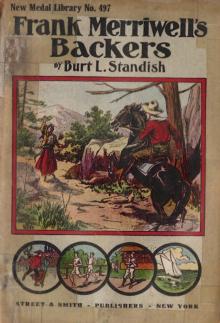 Frank Merriwell's Backers; Or, The Pride of His Friends
Frank Merriwell's Backers; Or, The Pride of His Friends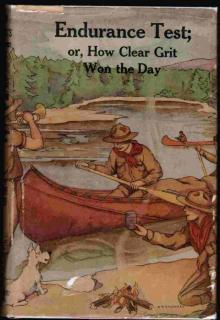 Endurance Test; or, How Clear Grit Won the Day
Endurance Test; or, How Clear Grit Won the Day Great Hike; or, The Pride of the Khaki Troop
Great Hike; or, The Pride of the Khaki Troop The Swan and Her Crew
The Swan and Her Crew A cup of sweets, that can never cloy: or, delightful tales for good children
A cup of sweets, that can never cloy: or, delightful tales for good children Frank Merriwell's Bravery
Frank Merriwell's Bravery Frank Merriwell Down South
Frank Merriwell Down South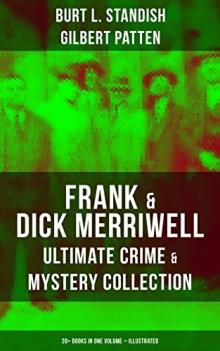 Dick Merriwell's Trap; Or, The Chap Who Bungled
Dick Merriwell's Trap; Or, The Chap Who Bungled The Trail of the Seneca
The Trail of the Seneca Wild Life in the Land of the Giants: A Tale of Two Brothers
Wild Life in the Land of the Giants: A Tale of Two Brothers From Squire to Squatter: A Tale of the Old Land and the New
From Squire to Squatter: A Tale of the Old Land and the New The Cruise of the Snowbird: A Story of Arctic Adventure
The Cruise of the Snowbird: A Story of Arctic Adventure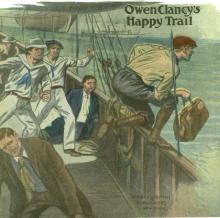 Owen Clancy's Happy Trail; Or, The Motor Wizard in California
Owen Clancy's Happy Trail; Or, The Motor Wizard in California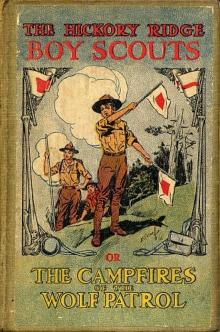 Boy Scouts: Tenderfoot Squad; or, Camping at Raccoon Lodge
Boy Scouts: Tenderfoot Squad; or, Camping at Raccoon Lodge Sing a Song of Sixpence
Sing a Song of Sixpence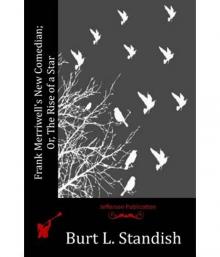 Frank Merriwell's New Comedian; Or, The Rise of a Star
Frank Merriwell's New Comedian; Or, The Rise of a Star The Sa'-Zada Tales
The Sa'-Zada Tales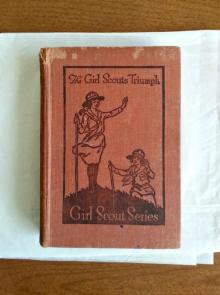 The Girl Scout's Triumph; or, Rosanna's Sacrifice
The Girl Scout's Triumph; or, Rosanna's Sacrifice Wild Adventures in Wild Places
Wild Adventures in Wild Places Fairies I Have Met
Fairies I Have Met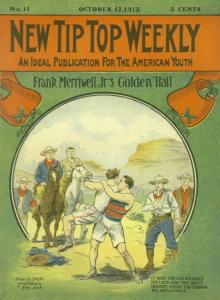 Frank Merriwell's Son; Or, A Chip Off the Old Block
Frank Merriwell's Son; Or, A Chip Off the Old Block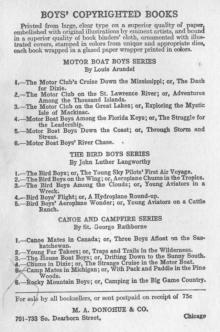 Motor Boat Boys' River Chase; or, Six Chums Afloat and Ashore
Motor Boat Boys' River Chase; or, Six Chums Afloat and Ashore Frank Merriwell's Athletes; Or, The Boys Who Won
Frank Merriwell's Athletes; Or, The Boys Who Won Bart Keene's Hunting Days; or, The Darewell Chums in a Winter Camp
Bart Keene's Hunting Days; or, The Darewell Chums in a Winter Camp Captain June
Captain June